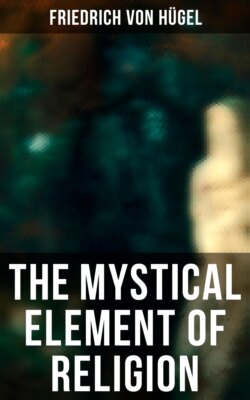Читать книгу The Mystical Element of Religion - Friedrich von Hügel - Страница 65
На сайте Литреса книга снята с продажи.
Introductory. Each of the three Elements of Religion, again multiple. The two main functions of each.
ОглавлениеWe have so far considered religion as constituted, on its human side, by the interaction of three modalities,—the Historical, the Intellectual, the Experimental. But it is of course clear that each of these is again, just because it is a living force, a Multiplicity in Unity. The first distinction we can find in each would break each up into two parts.
The Historical modality readily gives us the function busy with the Historical Person and the function occupied with the Historical Thing. The former function will insist upon all the temporal and local sayings, doings, and happenings, that together make up the picture and memory of the Prophet or Founder; the latter will transmit certain rites and symbols instituted or occasioned by him. And either the suppression of these latter things, or the taking them apart from the person from whom they issued and to whom they ever should lead back, will turn out equally impoverishing: the very friction of this Thing, coming from a Person, and leading to a Person, and operating within our own personality, will be found to help to make the latter truly such.
The Intellectual modality will as readily split up into the Analytic and the Synthetic. The former will busy itself with distinguishing and weighing, and with reducing everything as far as possible to its constituent elements. The latter will attempt to reconstitute the living whole, as far as may be, in such terms of clear reason. The former will have more affinity with the discursive reason, the second with the contemplative; the former with religious History, and the approaches to religious Philosophy,—Physiology and Experimental Psychology and the Theory of Knowledge; the latter with Religious Philosophy proper,—the Metaphysics of Religion.
The Experimental modality, finally, will as readily break up into Intuitions and Feelings of every mental and moral kind, and Willings, the determinations of which, close as they are to the feelings, are not identical with them, but often exist more or less without or even against them.
And this whole series of six movements exists only in Persons; it begins with an at least incipient Person and ends in the fullest self-expression of Personality, the determination of the will. And Things—both external (Institutions) and internal (analytic and synthetic Abstractions)—are but ever operative, necessary means towards the firm constitution and expansion of that rich life of the living soul within which the first apprehension and ordering of such thinkings and doings took their rise.
